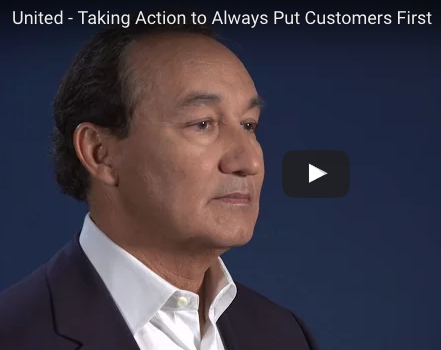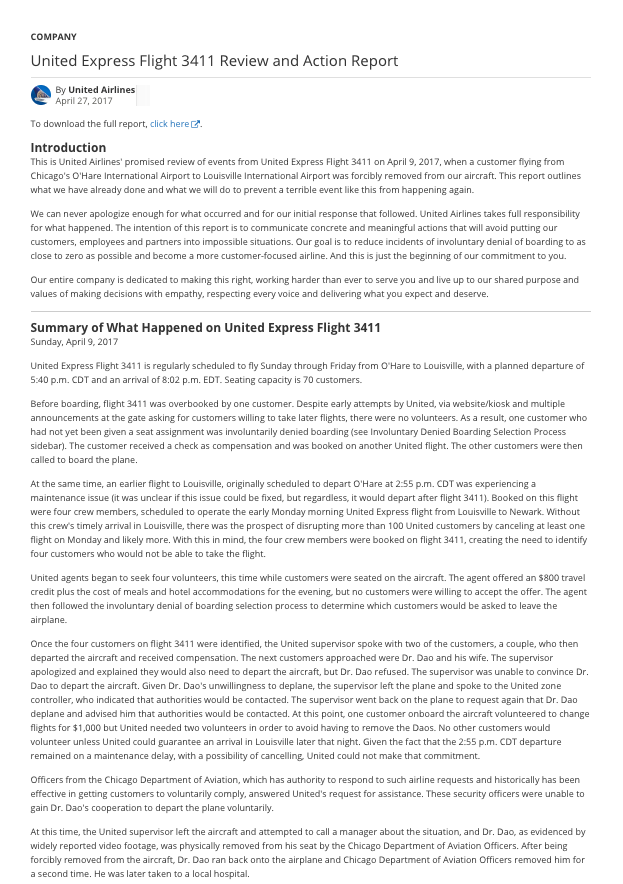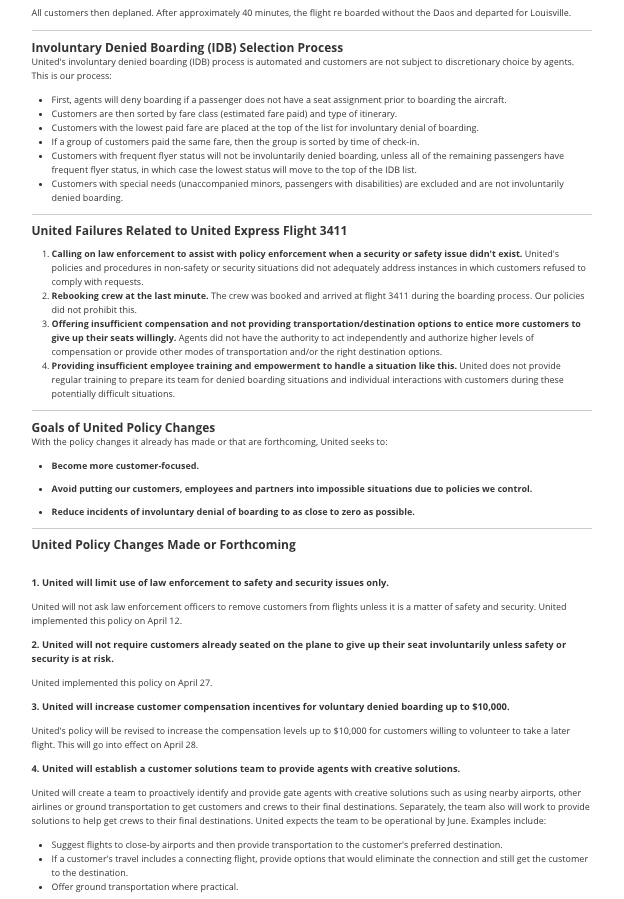Comparing today’s United Airlines statements (mostly right) to what they said before (really wrong)

Two-and-a-half weeks after dragging a passenger off a flight like a rag doll, United Airlines has released a statement about changes to its procedures and emailed all its frequent flyers. Everything they did wrong in the original statements, they’ve now done right. And the two sets of statements give me a unique opportunity to contrast effective and bullshit communications.
United’s brand is damaged; the repair process is going to take a long time, regardless of these statements. Now the company has released a statement that’s clear, direct, takes responsibility, apologizes appropriately, and most importantly, describes substantive changes that the company will make. It has also emailed its frequent flyers about the changes.
These humble and apologetic statements are a complete U-turn from the company’s attitude in its original, defensive statements. Let’s see how they differ.
Apologies should be sincere, unqualified, and directed at the injured party
On the day of the incident, here’s how United apologized:
We apologize for the overbook situation.
Then, a little later, from CEO Oscar Munoz:
I apologize for having to re-accommodate these customers.
Neither of these apologies take responsibility — they make United seem like a victim of circumstances. And “re-accommodate” is a reprehensible euphemism for knocking a customer unconscious and then dragging him down the aisle.
Here’s how United apologized yesterday. From the statement:
We can never apologize enough for what occurred and for our initial response that followed. United Airlines takes full responsibility for what happened.
And in the frequent flyer email:
Earlier this month, we broke that trust when a passenger was forcibly removed from one of our planes. We can never say we are sorry enough for what occurred, but we also know meaningful actions will speak louder than words.
The new apologies are better than the originals, which were pathetic. They are sincere and believable. They could still be better. United should have directed them at the injured passenger, Dr. Dao. (United has now reached what is undoubtedly a multi-million dollar damage settlement with Dr. Dao.) And they should have been more specific (“We apologize for calling law enforcement to remove a passenger who had already boarded.”)
When you have made a mistake, active voice is part of taking responsibility
Here are some of the passive statements in United’s original statements (passives in bold):
Flight 3411 from Chicago to Louisville was overbooked. After our team looked for volunteers, one customer refused to leave the aircraft voluntarily and law enforcement was asked to come to the gate. We apologize for the overbook situation. Further details on the removed customer should be directed to authorities.
These statements avoid responsibility for the overbooking and for calling law enforcement. Contrast this to the active voice in United’s new policy statements:
United will limit use of law enforcement to safety and security issues only. United will not ask law enforcement officers to remove customers from flights unless it is a matter of safety and security. United implemented this policy on April 12.
United will not require customers already seated on the plane to give up their seat involuntarily unless safety or security is at risk.
United will increase customer compensation incentives for voluntary denied boarding up to $10,000.
The frequent flyer letter is also filled with active voice promises, but still indulges in the passive in some places.
For the past several weeks, we have been urgently working to answer two questions: How did this happen, and how can we do our best to ensure this never happens again? It happened because our corporate policies were placed ahead of our shared values.
That’s why we announced that we will no longer ask law enforcement to remove customers from a flight and customers will not be required to give up their seat once on board – except in matters of safety or security.
What’s wrong with “We placed corporate policies ahead of our shared values” and “We will not require customers to give up their seat once on board”? The passive habit is hard to break because it requires a high degree of honesty and responsibility.
Structure creates clarity
It’s easy to hide behind prose. But when you’re seeking to be clear and factual, paragraphs can get in the way. That’s why I was pleased to see that United’s final statement on the incident used bullets and subheads to make it even clearer what the company would be doing:


Finally, United is getting it right on the substance
The best part of the United statement is the list of things they are actually changing. These make so much more sense than the alternatives. In what follows, the first numbered item is United’s new policy, and the alternatives are what I imagine was the airline’s previous arrogant attitude.
- United will limit use of law enforcement to safety and security issues only.
Alternative: Do what we say or we call the guys with the uniforms and the nightsticks. - United will not require customers already seated on the plane to give up their seat involuntarily unless safety or security is at risk.
Alternative: You think that’s your seat? Nope. It’s ours. - United will increase customer compensation incentives for voluntary denied boarding up to $10,000.
Alternative: Do you want $800 or a beating? Your choice. - United will establish a customer solutions team to provide agents with creative solutions . . . such as using nearby airports, other airlines or ground transportation to get customers and crews to their final destinations.
Alternative: We deny the existence of any other form of transportation. - United will ensure crews are booked onto a flight at least 60 minutes prior to departure.
Alternative: While you need to get here 60 minutes ahead of time, but our crews can arrive as late as they want. - United will provide agents with additional annual training.
Alternative: Agents should make it up as they go along. - United will create an automated system for soliciting volunteers to change travel plans.
Alternative: We automate everything else, but when it come time to kick people off planes, we wing it. - United will reduce its amount of overbooking.
Alternative: An empty seat is a cardinal sin, so we book more passengers than seats whenever possible. Musical chairs is such a fun game. - United will empower employees to resolve customer service issues in the moment.
Alternative: United will expect its employees to hide behind procedures rather than using common sense. - United will eliminate the red tape on lost bags.
Alternative: Let’s throw in a statement about baggage to see if anyone’s listening.
Nice job, United. We’ll be watching to see if your actions match your words.
Great analysis, Josh. Appreciate your attention to this issue and calling out what they got right as well as what they got wrong. We can all learn here.